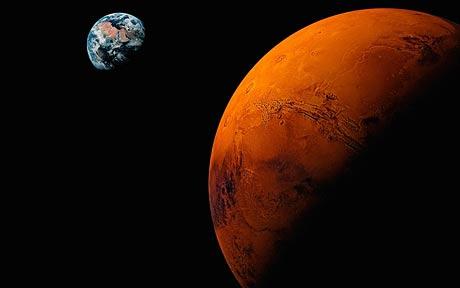
ONE-WAY TRIP TO MARS?
Everyone knows the U.S. has long explored the depths of space, with thoughts of one day attempting a manned mission to Mars. But in a new article entitled “To Boldly Go,” two scientists are propelling the notion that human travel to Mars could happen quicker and cheaper if the missions are purposely designed to be only one-way. HUH???

 “The main point is to get Mars exploration moving,” said Dirk Schulze-Makuch of Washington State University, who wrote the article with Paul Davies of Arizona State University in the latest “Journal of Cosmology.” Both men are adamant that humans must begin colonizing another planet in preparation against a potential catastrophe on Earth. They say it’s important to realize they’re not proposing a “suicide mission,” clarifying to critics that “astronauts would go to Mars with the intention of staying for the rest of their lives, as trailblazers of a permanent human Mars colony.” Their argument is that a one-way mission would be no different from early settlers to North America, who left Europe with little to no expectation of ever returning.
“The main point is to get Mars exploration moving,” said Dirk Schulze-Makuch of Washington State University, who wrote the article with Paul Davies of Arizona State University in the latest “Journal of Cosmology.” Both men are adamant that humans must begin colonizing another planet in preparation against a potential catastrophe on Earth. They say it’s important to realize they’re not proposing a “suicide mission,” clarifying to critics that “astronauts would go to Mars with the intention of staying for the rest of their lives, as trailblazers of a permanent human Mars colony.” Their argument is that a one-way mission would be no different from early settlers to North America, who left Europe with little to no expectation of ever returning.
Mars is a 6 month flight from Earth, and has already been discovered to have necessary surface gravity, an atmosphere, abundant water, carbon dioxide and essential minerals. Davies and Schulze-Makuch propose the missions initially commence with separate ships of dual 2-person teams, with more colonists and regular supply ships to later follow. They say the technology already exists and would make a sooner-than-later mission within easy reach. NASA officials say they believe a manned mission to Mars could happen within the next few decades, but would certainly involve a round-trip. President Obama said he “believes by the mid-2030s that we could send humans to orbit Mars and safely return them to Earth.” But a landing would soon follow, according to NASA spokesman Michael Braukus, who made it clear: “We want our people back.”
 Exactly how would a one-way mission to Mars affect the trailblazing pioneers who’d be part of it? Mental health studies of humans who have spent time in space, found that depression can easily set in, people can quickly become irritated with each other, and sleep can be disrupted. And in a one-way mission, the knowledge that there is no quick return to Earth would likely make all the above worse. But the scientists say psychological profiling and training of the astronauts, as well as constant communication with Earth, would be key in reducing debilitating mental strains. “They would in fact feel more connected to home than the early Antarctic explorers.” Schulze-Makuch also pointed out it’s important to “send a little bit older folks, around 60 or something like that,” since the mission would undoubtedly reduce a person’s lifespan, from a lack of medical care and exposure to radiation. He added that radiation would also damage human reproductive organs, so sending people of childbearing age would not be a good idea.
Exactly how would a one-way mission to Mars affect the trailblazing pioneers who’d be part of it? Mental health studies of humans who have spent time in space, found that depression can easily set in, people can quickly become irritated with each other, and sleep can be disrupted. And in a one-way mission, the knowledge that there is no quick return to Earth would likely make all the above worse. But the scientists say psychological profiling and training of the astronauts, as well as constant communication with Earth, would be key in reducing debilitating mental strains. “They would in fact feel more connected to home than the early Antarctic explorers.” Schulze-Makuch also pointed out it’s important to “send a little bit older folks, around 60 or something like that,” since the mission would undoubtedly reduce a person’s lifespan, from a lack of medical care and exposure to radiation. He added that radiation would also damage human reproductive organs, so sending people of childbearing age would not be a good idea.
Both men recognize the safety hazards involved, which are certainly in the forefront of the minds of the suits at NASA. But they believe the people who would be willing to make the sacrifice do exist. Creating a Mars base would offer humanity a “lifeboat” in the event Earth becomes uninhabitable. “We are on a vulnerable planet,” Schulze-Makuch said, adding “asteroid impact can threaten us, or a supernova explosion. If we want to survive as a species, we have to expand into the solar system and likely beyond.”







